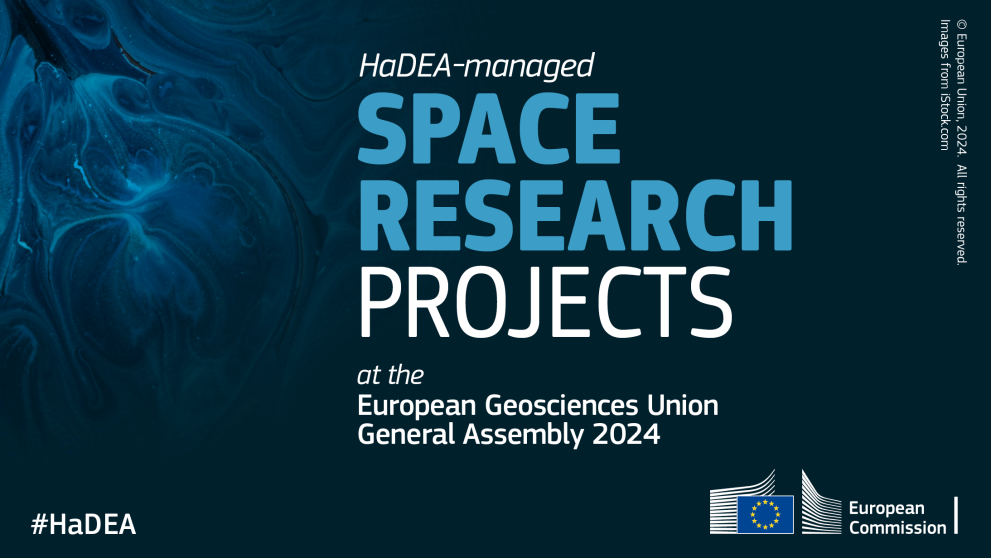
The European Geosciences Union (EGU) General Assembly (14-19 April, Vienna and online) brings together geoscientists from all over the world, covering all disciplines of Earth, planetary, and space sciences. EGU24 offers a forum for scientists to present their work and discuss their ideas with experts in all fields of geoscience.
HaDEA is managing a broad portfolio of EU space research projects in areas such as Earth Observation and space sciences. Discover some of the projects that will be represented at EGU24:
CAMEO
CAMEO aims to advance the products offered by the Copernicus Atmosphere Monitoring Service (CAMS), which delivers free data on air pollution and atmospheric composition. The project is preparing CAMS for the exploitation of new satellite data (incl. from upcoming Sentinels 4 and 5) and will develop novel data assimilation and inversion techniques.
Featured oral presentations:
• Session AS1.30 | Dynamics and chemistry of the upper troposphere and lower stratosphere - Oleg Dubovik (EGU24-11607)
• Session AS3.18 | Atmospheric Composition and Numerical Weather Forecasting - Gael Descombes (EGU24-9296) and Vincent Huijnen (EGU24-10683)
• Session AS3.31 | Geo-Ring for Air Quality - Zoi Paschalidi (EGU24-19066)
CERISE
CERISE seeks to boost the performance of the Copernicus Climate Change Service (C3S), which provides authoritative information about the past, present, and future climate in Europe and the rest of the world. With a focus on land–atmosphere coupling, CERISE will improve the quality of the C3S re-analysis and seasonal forecast portfolio.
Featured oral presentations:
• Session CL4.10 | Challenges in climate prediction: multiple time-scales and the Earth system dimensions - Gabriel Narváez and Constantin Ardilouze (EGU24-5484)
• Session HS6.1 | Remote Sensing of Soil Moisture - Peter Weston (EGU24-1769)
• Session HS10.6 | Lakes and Inland Seas under Global Change - Margarita Choulga (EGU24-12466)
CORSO
CORSO is supporting the creation of a new European anthropogenic CO2 emissions Monitoring and Verification Support capacity (CO2MVS), to be implemented within CAMS. It aims to deliver capabilities at global and local scale to optimally use observations of co-emitted species and to better separate fossil fuel emissions from other sources of atmospheric CO2.
Featured oral presentations:
• Session AS3.38 | Science-based, measurement-based greenhouse gas monitoring and emission estimates - Marc Guevara (EGU24-16000)
• Session AS3.40 | Attribution of GHG emissions using isotope ratios and other tracers - Marya el Malki (EGU24-16750) and Carlos Gómez-Ortiz (EGU24-10553)
SERPENTINE
SERPENTINE looks to answer several important space weather questions about the origin of Solar Energetic Particle (SEP) events. The project is providing an advanced platform for the analysis and visualisation of high-level datasets for the benefit of the global heliophysics community.
Featured oral presentations:
• Session ST1.5 | Energetic Particles and Shocks in the Heliosphere and as a Space Weather Hazard – Various presentations, including by Nina Dresing (EGU24-6034), Laura Rodríguez-García (EGU24-6131), Laura Vuorinen (EGU24-8560), Diana Morosan (EGU24-5558), Manon Jarry (EGU24-417) and Stefan Jensen (EGU24-8772), chaired by project coordinator Rami Vainio.
SPEARHEAD
SPEARHEAD plans to leverage very-high-energy particle observations from the most important heliophysics missions and ground-based measurements to answer key questions related to particles and solar eruptions. The project will develop innovative solutions to derive high-energy particle fluxes from observations, improve the use of monitoring data and enhance the analysis of solar eruptions.
Featured oral presentations:
• Session ST1.2 | Solar Orbiter: connecting the Sun and the inner Heliosphere - Eleni Lavasa (EGU24-17889)
• Session ST1.5 | Energetic Particles and Shocks in the Heliosphere and as a Space Weather Hazard - Marlon Köberle (EGU24-8445)
Background
EU Space Research aims to foster a cost-effective, competitive, and innovative space industry and research community. Under Horizon Europe Cluster 4 – Space (Destination 5), HaDEA is funding projects that prepare future evolutions of the EU Space Programme components, foster the EU space sector’s competitiveness, reinforce its independent capacity to access space, and secure its autonomy of supply for critical technologies.
Relevant links
Details
- Publication date
- 15 April 2024
- Author
- European Health and Digital Executive Agency
- Programme Sector
- Space
- Programme
- Horizon Europe
- Horizon Europe Cluster 4: Space
- Tags
- EUFunded
- Event
- Scientific research
